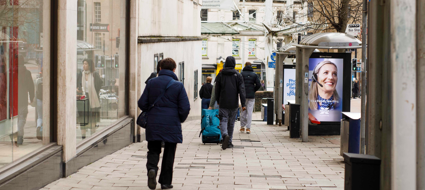Hoarding is an undiscovered country. We are familiar with its objective reality, but its determinants remain ubiquitous, entrenched and elusive.
Hoarding is classified as a medical condition, but it is much more than a diagnosis.
At the London Borough of Camden, we have become interested in ‘Hoardiculture’.
What is Hoardiculture?
Hoardiculture refers to elements of material culture or cultural studies that seem to be missing in other standard approaches for hoarding.
The standard approaches foreground attachment theory, loss, deprivation experience, trauma-based approaches, Cognitive Behaviour Therapy; but seemed to miss out on the meaning of these archives, or collections, the landscape of the hoard, the identity of the client and co-productive endeavor.
Thinking about the photographer Trevor Appleson's art made me reflect that an educational strength-based approach on this ‘Hoardiculture’, on place, material culture and cultural memory, might help people struggling to recognise and make use of their resources, rather than the implicit standard therapeutic approach that focuses on problems, deficits and dysfunction.
So let me get this straight
In contrast, the Hoardicultural approach generates from our strength-based, What Matters, work at the London Borough of Camden. What Matters aims to support residents to focus not on what's wrong but what they can do instead.
It aims to:
- focus on what is most important to a person.
- recognise and build on their strengths as individuals and within their networks.
- help a person to stay connected to their community.
- work with them to identify problems and intervene early. This will help to tackle the root causes of any problems, not just the symptoms.
By focusing on what people can do, rather than what they can’t it promotes their strengths and connections which are vital.
With this endeavour in mind I have written ‘So let me get this straight’ a poem that embodies these ideas.
I hope this brief piece reflects our theme and mission on Hoardiculture and I would like to share it with you.
To everybody here who has difficulties with decisions.
Welcome!
Yes, welcome, my fellow princesses and princes of Denmark!
Let us be clear!
To be, or not to be, that is the question
To keep, or not to keep,
To throw away or to store,
That is the question.
We do not as yet, have a diagnosis,
We do not, as yet, share a pathology,
We do not, as yet, have a syndrome,
We do not as yet, have an assessment,
We do not as yet, have a pathway,
Our own little `Disorders’,
Will only become medical,
When we have so much stuff that,
We can't get out of the door,
Or others can't get in.
But that is not us!
Not yet, Oh no! No, no.
Our living spaces haven't become so sufficiently cluttered
‘So as to preclude activities
To which those spaces were designed’,
Oh no, not yet!
What a relief!
Come in friends!
Our rooms and halls are as clean as our consciences,
If clutter is the defining characteristic,
Directly tied to the functional deficit,
Associated with the `Symptom’
The `Symptom’ of `Hoarding’
We are saved!
Indeed, our own possessions
Are what we work,
And strive for,
So, can I have my book back please?
You have had it a little too long!
You know that I have an emotional attachment,
To this object,
It has a human-like status and must be protected from harm.
By protecting our possessions,
We are,
As I'm sure, you will all agree?
Merely protecting ourselves!
But my fellow Princesses and Princess,
We are not hoarders,
Oh no! no!, no, tut, tut
We have other titles (ha ha),
Oh yes, other names,
Collectors perhaps,
None of us here has persistent difficulties,
Discarding or parting
With our possessions,
(Goodbye! Sob, sob).
Regardless of their actual value
(How much? Why did you throw that away?)
We just save,
Because things cost too much
We like picking things up,
And if we do keep your book,
A little too long.
This difficulty is due,
To our perceived need to save it.
So don’t think of the distress,
Associated with losing it.
Like when you lost your phone!
But anyway, we hardly ever lose things, do we?
Do we?
There is no psychopathology, going on,
Oh no, no, no.
Our home is our castle,
It hath a pleasant seat,
Our keys kept on appropriate rings,
We only buy things that are ‘Useful’,
For contingency, you know.
Or we only buy objects,
That have a direct connection,
To our sense of self.
Our inner reality,
Like that beautiful red vase,
From Greenwich Antiques Market,
The very same vase that you knocked over
And broke,
Remember?
On Valentine's Day?
My anger was justified then,
You were so clumsy,
With my vase.
Of course, we would all be incandescent with rage!
At the loss!
But none of us here,
Contribute to obsessively controlling
And withholding behavior,
Resulting in the possessiveness of objects?
We would just like the book back, please!
OK, I do admit,
We are a little bit obsessive
About some things,
But obsessive-compulsive behavior?
Oh (1) no (2) no (3) no (4), no (5) no (6), no (7), no (8), no (9), no (10), no (1), no (2), no (3) …
I only check the cooker, my dear,
Several times,
Because you persist in leaving it on!
Despite my notes, entreaties and plans,
if we are a (little bit) obsessive compulsive,
Saving and storing,
Switching off and checking,
Forgive us!
We are only human.
It stems from our own early childhood experiences
Of deprivation, poverty, and trauma
Although actually we experienced none,
of these.
But we do save because of fear
Not that we are fearful,
You understand?
Just a little bit scared!
But let's leave these philosophical discussions!
My worthy friends, my titled acquaintances,
To be, or not to be, that is the question,
And we are not hoarders,
No, no, no.
We are complete professionals, titled, registered
Let us all take arms, then!
Against this sea of hoarding troubles,
And as `Professionals’ visit the ‘undiscovered country of the hoarder’.
Let us go on a Home Visit.
And here I am,
At the home.
You are the hoarder,
And I am?
I need a title.
So, social worker, will do;
but it could be an Environmental Health Officer, floating support worker, GP, Occupational therapist, Police, LAS,
And here I am,
And here we are,
At four o'clock in the afternoon
But it could be time before,
or time after.
In this place
It is cold in here,
It is a nipping and eager air.
But what is that smell?
Decayed fruit and other things,
I cannot possibly mention.
Certainly not perfume from Arabia,
We can't see the bathroom,
or the kitchen floor,
In this place,
Your home.
A place of disaffection,
According to the emails from health colleagues,
According to the multiple calls from neighbours,
According to the letters from the landlord,
According to the notices from environmental health officers,
Oh, look the London Fire Brigade have visited,
Bless them,
Oh look, the police have taken off the door.
Yes, it is four, but it could be the time before,
Or the time after,
Such dim daylight,
Shadows become forms,
Lucid stillness,
Transient beauty,
And here you are,
The hoarder,
You have filled up your place,
And now you still fill me up,
With your words
Yet, you find quarrel in a straw.
Your phases of sorrow conjure the wandering stars.
Your interest in the old,
Worn and worn out,
The declined,
Time ravaged,
Eroded and blighted.
Your collection of the used,
Abused and abandoned treasures,
That you collect daily with your shopping trolley,
With an old transistor radio tied to the handle.
The aperture of my pupils dilates in this dark space,
Of your cave.
I begin to see more see more.
There is a strange order here (and a strange odor!)
Structured volumes,
Time pieces,
Memory and contrast in textures,
Endless graduations,
Your postponed decisions,
To keep or not to keep
Your everyday objects,
Of our industrial culture,
Your things, remain on the cusp
of postponed decisions,
Your things have entered a twilight age,
In terms of usefulness,
And attractiveness.
Dust like sprinkled cinnamon over your fridge,
Which now stores obscure legal paperwork,
Dust spread like paprika over your television
Now used as a light source.
To illuminate your stalled projects,
Of appropriation,
Remembering and understanding.
Perhaps, my friends, in the hoarder’s home,
We have reached the bridge,
Of Hoardiculture,
And as I have said before, must give us pause,
Indicates that we are all on the same continuum,
The same bridge.
That I need to reach across,
To cope with the heartache,
And the thousand natural shocks,
That the flesh is heir to.
To be or not to be,
Is the question,
For all of us,
And I need to understand,
What you have discovered,
What you might rediscover and render useful again,
As your own project, to move forward together,
As I listen to and respect
Your personal memories,
What matters to you,
And where you have come from,
And where I might go with you.
Hoardiculture.
To support practitioners working in this area we have also developed a helpful tool that can be used in assessments. The tool provides a helpful checklist and considers wellbeing.
Please note that our and our client’s identity is never a neutral or objective phenomena. She/he is never just a client or just or a hoarder.
Their identity is about what matters to them, it is culture, a matter of position, of the place from which they can speak to whom and for what purpose.



